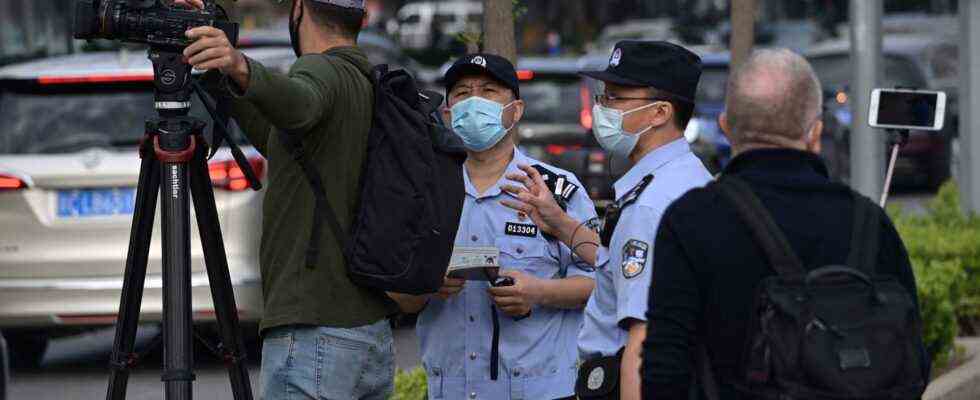Status: 08/12/2021 5:21 am
The working conditions of foreign correspondents in China have deteriorated massively. Free movement in the country and unhindered contact with interlocutors are hardly possible any more. Recently there were even attacks.
A street scene on the edge of the flood disaster in the Chinese province of Henan: A journalist is out and about for Deutsche Welle, amidst Chinese passers-by, whom he asks for interviews. But this does not occur. The correspondent is insulted: “Why are you all talking badly?”, The correspondent is attacked. “I hate you,” says the man at the end of the video clip.
The scene is repeatedly broadcast on Chinese state television and social media as evidence of how allegedly false and biased Western media reported about China. The German correspondent is accused of lying – because he said in his report that he did not consider the transparency in dealing with the death tolls of the flood disaster to be sufficient.
The angry passers-by confused the German with reporters from CNN or BBC. These two are especially in the crossfire. The BBC, the Xinhua video claims, uses neutral density filters to make reports look particularly hopeless.
Unwanted recordings
The Foreign Correspondents Club of China, the unofficial representation of foreign correspondents in the People’s Republic, reported on Twitter about a number of incidents related to the flood. The association describes how reporters were persecuted, attacked and forced to delete film recordings.
It is particularly alarming that the Henan Provincial Communist Youth League has called on its 1.6 million followers on the Weibo website to report the whereabouts of BBC reporter Robin Brant. The BBC, LA Times, and others have since received abusive phone calls and messages and even death threats.
This year, Reporters Without Borders ranks the People’s Republic of China fourth from bottom of the 180 countries in the world in terms of freedom of the press.
A smear campaign against China?
In the video from the Xinhua news agency, Western media are accused of a smear campaign against China. Deliberately false reports should put the People’s Republic in a bad light.
A post on the digital platform Weibo also warns against the Chinese employees of Western correspondents: “These Chinese employees have been specially selected and have received strict ideological training. They are even taught by the Western media houses how to investigate the national security authorities . “
There is no such training. And: The Chinese employees of Western media are only partially their employees, because purely formally they are employees of a Chinese state-owned company. Without being registered with this, a Chinese may not work as a foreign correspondent.
An atmospheric change
In principle, reporting from the People’s Republic is becoming more and more difficult. Ten years ago it was easily possible to ask passers-by on all kinds of topics. Riots like the one about the reporter from Deutsche Welle were unthinkable, but friendliness and openness on the part of the Chinese were the rule. Even with more problematic questions.
There were angry reactions in the run-up to the Olympic Games in Beijing in 2008 when Western media – including the Berliner Morgenpost – accidentally printed the wrong picture. But this incident remained the exception.
Please only use the correct images: China’s authorities are extremely sensitive to reporting natural disasters.
Image: AFP
Welcome but …
Today it seems to be different: even two weeks after the flood in Henan, the same allegations keep cropping up on Chinese websites that have been clicked a million times. The Xinhua News Agency closes its latest post by asking passers-by: “What do you expect from foreign media in China?” A young man replied: “We welcome foreign media to our place. But we expect their reports to be more objective, truthful and balanced.”
When asked about the growing pressure on foreign media, Foreign Ministry spokesman Zhao Lijian said there are always reasons for love or hate.
Signs of a different attitude are currently rare. But there is. The Hong Kong newspaper “South China Morning Post” reported on Zhao Qizheng, a former spokesman for the Chinese State Council, quoting him as follows: “We need more communication with foreign media outlets such as the Wall Street Journal and the New York Times. Us must not be unfriendly to them for criticizing us. The reports from important foreign media are very important. We have to take them seriously. “
The appeal for moderation was spread by the Volkszeitung, the organ of the communist party.
“I hate you!” – Foreign correspondents in China
Astrid Freyeisen, ARD Beijing, August 10, 2021 12:48 a.m.

